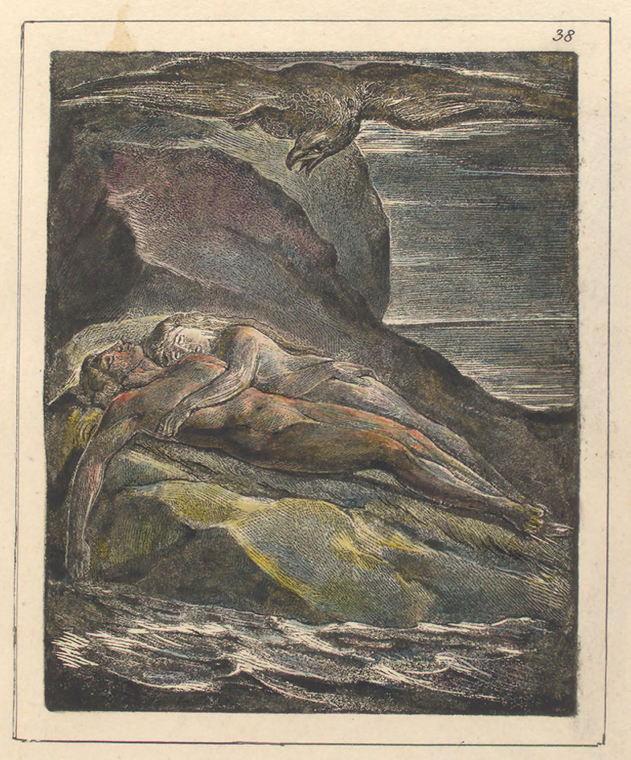- "Father of jealousy. be thou accursed from the earth!" (And 4 lines earlier:)
Are not these the places of religion, the rewards of continence?
Otherwise the metaphysical (or mythological) 'species' presents an
early (1793) version of the myth of the Kore; Oothoon is of course
Persephone":
- "The Golden nymph replied; pluck thou my flower Oothoon the mild"
Like all of his creations VDA addresses metaphysical and political concerns. The reader unfamiliar with Blake's thought forms and symbology will find much of it enigmatic, but a number of passages transparently reveal his thoughts and feelings about the relations between man and woman:
Oothoon, the soft soul of America, like an earlier maiden named Persephone, plucks a flower and pays the price. Persephone, you may remember, was rapt away into the underworld to be the bride of Pluto. In Oothoon's case the price began when, on her way with delight to her lover, Theotormon, she is raped by Bromion, a most rigid representative of the law, in fact a law abiding the slave trade.
Thereafter Oothoon and Bromion are bound back to back in Theotormon's cave with what is commonly known as a ball and chain.
Typically Blake lays sexual oppression at the door of false religion. In the midst of Oothoon's lament, after a long series of Job-like questions, we read:
- " With what sense does the parson claim the labour
of the farmer? What are his nets & gins and
traps; & how does he surround him With cold
floods of abstraction, and with forests of
solitude, To build him castles and high spires,
where kings and priests may dwell; Till she who
burns with youth, and knows no fixed lot, is
bound In spells of law to one she loaths? and
must she drag the chain of Life in weary lust?
must chilling, murderous thoughts obscure The
clear heaven of her eternal spring;"
(VDA 5:17-24 Key 193)
Theotormon's jealousy casts Oothoon out and darkens her into "a solitary shadow wailing on the margin of non-entity". Blake developed this theme at the beginning of 'The Four Zoas'. There he ascribed the jealousy to Enion; it precipitated the Circle of Destiny (The Four Zoas [Nt 1], 5.)(all our sorrow!), sank Tharmas into the sea and condemned Enion to the very "margin of non-entity" of which Oothoon had spoken.
To perceive a lover or spouse as a possession (a thing) is a fatal act that brings about the deterioration of life. In fact the nature of fallenness is to degrade the person (the real) to the material (the illusory). The one tormented by jealousy loses the capability of creative life; in biblical language he covers his soul with a thick layer of miry clay, not to mention what he does to others! The profound theological corollary suggested by VDA. is that if we weren't jealous people, we wouldn't have a jealous God. Obviously the Old Testament symbol of a jealous God has other meanings, but rightly or wrongly that is what it seems to have meant to Blake.
Long before Freud's day Blake understood and described the close relationship, in fact the identity, between sexuality and creativity. He considered sexual fulfilment the primary means of artistic achievement. The picture in 'Milton' plate 38 portrays the post coital moment with the eagle of inspiration hovering above.
On the other hand all the evils of life Blake related to frustrated or sick sex. War in particular is perverted sexuality. The worship of the Queen of Heaven induces chastity with war as a substitute fulfilment. Blake's warrior cries, "I am drunk with unsatiated love, I must rush again to War, for the Virgin has frowned and refused."
Blake's mind was fourfold, which means that most of what he wrote is susceptible to more than one meaning. David Erdman in Prophet Against Empire saw VDA as political oratory at the service of the anti-slavery lobby. Oothoon is the type of the slave (of either sex); (in slave times the owner often claimed prenuptial privileges with the body of his slave). Bromion is the type of the merciless slave trader, and Theotormon of the wishy-washy conformist who can't quite bring himself to express his opposition to slavery (much as the many good Christians in America who couldn't quite bring themselves to condemn the war).
Here is an interesting file on Oothoon and her two men.
(This post replaces an earlier one entitled Sex IV.)
On the other hand all the evils of life Blake related to frustrated or sick sex. War in particular is perverted sexuality. The worship of the Queen of Heaven induces chastity with war as a substitute fulfilment. Blake's warrior cries, "I am drunk with unsatiated love, I must rush again to War, for the Virgin has frowned and refused."
Blake's mind was fourfold, which means that most of what he wrote is susceptible to more than one meaning. David Erdman in Prophet Against Empire saw VDA as political oratory at the service of the anti-slavery lobby. Oothoon is the type of the slave (of either sex); (in slave times the owner often claimed prenuptial privileges with the body of his slave). Bromion is the type of the merciless slave trader, and Theotormon of the wishy-washy conformist who can't quite bring himself to express his opposition to slavery (much as the many good Christians in America who couldn't quite bring themselves to condemn the war).
Here is an interesting file on Oothoon and her two men.
(This post replaces an earlier one entitled Sex IV.)

This highlights what I think to be te most imrtant point of the poem which is Blakes comlete contempt for the idea that woman are a possesion. One could almost say that Blake was a feminist
ReplyDelete:)
ReplyDelete